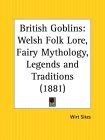Welsh Legends
|
Welsh Legends |
|
| Erectile Dysfunction | Home | Biography | Business | Computing | Fiction | Food and Drink | Gardening | History | Learning | Psychology | Travel |
| Erectile Dysfunction Home Prehistory History American History British History Canadian History Celtic/Welsh History |
|
The Tale of ElidurusFrom British Goblins Welsh Folk-lore, Fairy Mythology, Legends and Traditions by Wirt Sikes (1881)Closely akin to the subject of changelings is that of adults or well-grown children being led away to live with the Tylwyth Teg. In this field the Welsh traditions are innumerable, and deal not only with the last century or two, but distinctly with the middle ages.Famed among British goblins are those fairies which are immortalised in the Tale of Elidurus. This tale was written in Latin by Giraldus Cambrensis (as he called himself, after the pedantic fashion of his day), a Welshman, born at Pembroke Castle, and a hearty admirer of everything Welsh, himself included. He was beyond doubt a man of genius, and of profound learning. In 1188 he made a tour through Wales, in the interest of the crusade then in contemplation, and afterwards wrote his book - a fascinating picture of manners and customs in Wales in the twelfth century. The scene of the tale is that Vale of Neath, already named as a famous centre of fairyland. Elidurus, when a youth of twelve years, 'in order to avoid the severity of his preceptor,' ran away from school, 'and concealed himself under the hollow bank of a river. After he had fasted in that situation for two days, 'two little men of pigmy stature appeared to him,' and said, 'If you will go with us, we will lead you into a country full of delights and sports.' Assenting, Elidurus rose up and 'followed his guides through a path at first subterraneous and dark, into a most beautiful country, but obscure and not illuminated with the full light of the sun.' All the days in that country 'were cloudy, and the nights extremely dark.' The boy was brought before the king of the strange little people, and introduced to him in the presence of his Court. Having examined Elidurus for a long time, the king delivered him to his son, that prince being then a boy. The men of this country, though of the smallest stature, were very well proportioned, fair-complexioned, and wore long hair. 'They had horses and greyhounds adapted to their size. They neither ate flesh nor fish, but lived on milk-diet, made up into messes with saffron. As often as they returned from our hemisphere, they reprobated our ambition, infidelities, and inconstancies; and though they had no form of public worship, were, it seems, strict lovers and reverers of truth. The boy frequently returned to our hemisphere, sometimes by the way he had gone, sometimes by others; at first in company, and afterwards alone; and made himself known only to his mother, to whom be described what he had seen. Being desired by her to bring her a present of gold, with which that country abounded, he stole, whilst at play with the king's son, a golden ball with which he used to divert himself, and brought it in haste to his mother, but not un-pursued; for, as he entered the house of his father, he stumbled at the threshold;' the ball fell, 'and two pigmies seizing it, departed, showing the boy every mark of contempt and derision. Notwithstanding every attempt for the space of a year, he never again could find the track to the subterraneous passage. He had made himself acquainted with the language of his late hosts, ' which was very conformable to the Greek idiom. When they asked for water, they said Udor udorum; when they want salt, they say Halgein udorum. The legend of the 'Meddygon Myddfai' is another tale about a farmer in the parish of Myddfai, Carmarthenshire, who, having bought some lambs in a neighbouring fair, led them to graze near Llyn y Fan Fach, on the Black Mountains. Whenever he visited these lambs three beautiful damsels appeared to him from the lake, on whose shores they often made excursions. Sometimes he pursued and tried to catch them, but always failed; the enchanting nymphs ran before him ... read more about the Meddygon Myddfai legend. |
 British Goblins: Welsh Folk Lore, Fairy Mythology, Legends and Traditionsby Wirt Sikes1881. In a certain sense Wales may be spoken of as the cradle of fairy legend. It is not now disputed that from the Welsh were borrowed many of the first subjects of composition in the literature of all the cultivated peoples of Europe. In the ground it covers, while this volume deals especially with Wales, and still more especially with South Wales, where there appear to have been human dwellers long before North Wales was peopled, it also includes the border counties, notably Monmouthshire. Illustrated. Contents: The Realm of Fairy; The Spirit World; Quaint Old Customs; Bells, Wells, Stones and Wagons. More information and prices from: Amazon.co.uk - British pounds Amazon.com - US dollars SeekBooks.com.au - Aus Dollars Amazon.ca - Canadian dollars Amazon.de - Euros Amazon.fr - Euros |
|
|
|
|
|
|
|
|
|
|
|
| Copyright © 1997-2006 Alan Price and HRM Guide Network contributors. All rights reserved. |